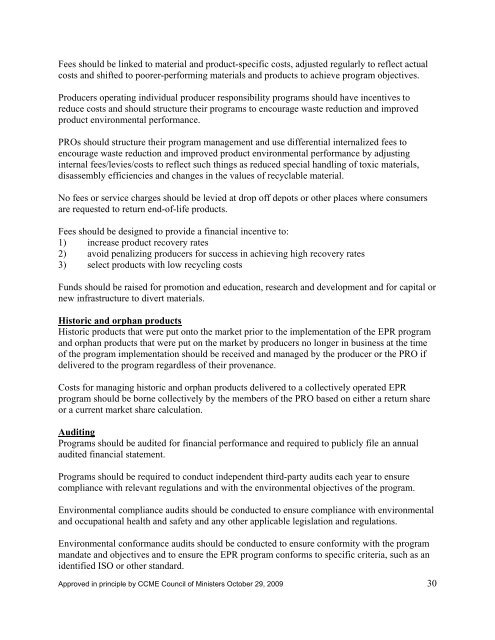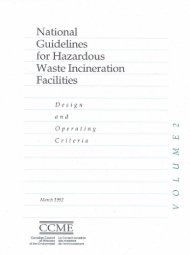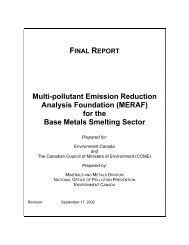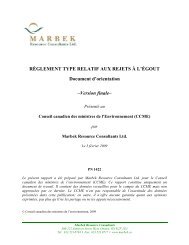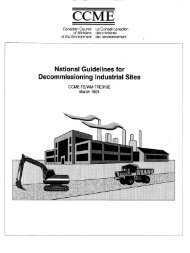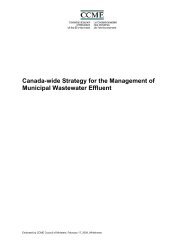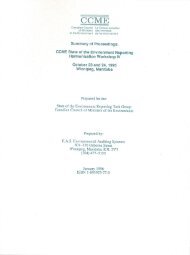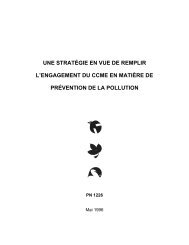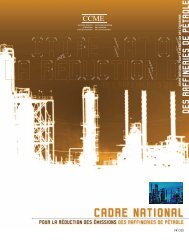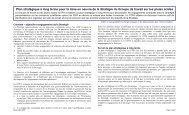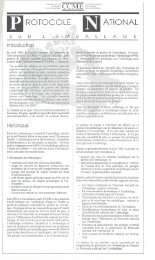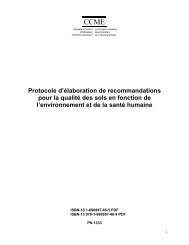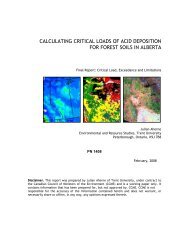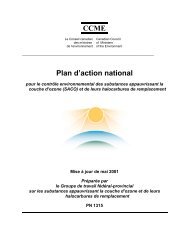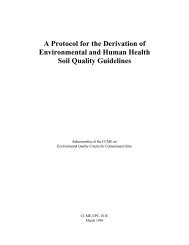Canada-Wide Action Plan for Extended Producer ... - CCME
Canada-Wide Action Plan for Extended Producer ... - CCME
Canada-Wide Action Plan for Extended Producer ... - CCME
You also want an ePaper? Increase the reach of your titles
YUMPU automatically turns print PDFs into web optimized ePapers that Google loves.
Fees should be linked to material and product-specific costs, adjusted regularly to reflect actual<br />
costs and shifted to poorer-per<strong>for</strong>ming materials and products to achieve program objectives.<br />
<strong>Producer</strong>s operating individual producer responsibility programs should have incentives to<br />
reduce costs and should structure their programs to encourage waste reduction and improved<br />
product environmental per<strong>for</strong>mance.<br />
PROs should structure their program management and use differential internalized fees to<br />
encourage waste reduction and improved product environmental per<strong>for</strong>mance by adjusting<br />
internal fees/levies/costs to reflect such things as reduced special handling of toxic materials,<br />
disassembly efficiencies and changes in the values of recyclable material.<br />
No fees or service charges should be levied at drop off depots or other places where consumers<br />
are requested to return end-of-life products.<br />
Fees should be designed to provide a financial incentive to:<br />
1) increase product recovery rates<br />
2) avoid penalizing producers <strong>for</strong> success in achieving high recovery rates<br />
3) select products with low recycling costs<br />
Funds should be raised <strong>for</strong> promotion and education, research and development and <strong>for</strong> capital or<br />
new infrastructure to divert materials.<br />
Historic and orphan products<br />
Historic products that were put onto the market prior to the implementation of the EPR program<br />
and orphan products that were put on the market by producers no longer in business at the time<br />
of the program implementation should be received and managed by the producer or the PRO if<br />
delivered to the program regardless of their provenance.<br />
Costs <strong>for</strong> managing historic and orphan products delivered to a collectively operated EPR<br />
program should be borne collectively by the members of the PRO based on either a return share<br />
or a current market share calculation.<br />
Auditing<br />
Programs should be audited <strong>for</strong> financial per<strong>for</strong>mance and required to publicly file an annual<br />
audited financial statement.<br />
Programs should be required to conduct independent third-party audits each year to ensure<br />
compliance with relevant regulations and with the environmental objectives of the program.<br />
Environmental compliance audits should be conducted to ensure compliance with environmental<br />
and occupational health and safety and any other applicable legislation and regulations.<br />
Environmental con<strong>for</strong>mance audits should be conducted to ensure con<strong>for</strong>mity with the program<br />
mandate and objectives and to ensure the EPR program con<strong>for</strong>ms to specific criteria, such as an<br />
identified ISO or other standard.<br />
Approved in principle by <strong>CCME</strong> Council of Ministers October 29, 2009 30


